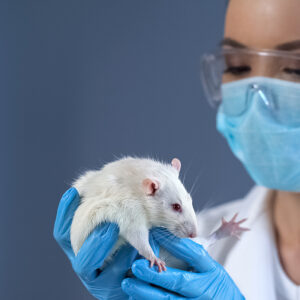No matter where you live, the recent surge of COVID-19 infections and hospitalizations is alarming. But as health experts have explained, in many ways what we’re experiencing right now is a pandemic of the unvaccinated. In almost every case, those who are in the ICU are not vaccinated (or not yet vaccinated). Let’s hope those who were concerned about the vaccines and adopted a wait-and-see approach now see the need to take urgent action.
It’s hard to know what the future holds. But there is one thing we know for certain: Animal research will help us eventually win the war against COVID-19. How do we know this? Because animal studies have already saved countless lives.
In the early days of the outbreak, studies in hamsters and other animals provided critical information about how the novel coronavirus spreads between individuals. As for how SARS-CoV-2 attacks the body, monkeys and ferrets offered answers to several key questions. For instance, scientists studied ferrets in order to observe firsthand precisely how the novel coronavirus takes over cells in our bodies, turning them into virus-replicating factories. Studies like this greatly informed worldwide efforts to fight back.
Most importantly, animal studies helped scientists develop safe and effective vaccines in record time. However, contrary to popular belief, the initial vaccines from Moderna and Pfizer were not created over a period of months. Much of the groundwork that made these lifesaving shots possible took place several decades ago. Critical proof-of-concept studies conducted in rodents in the 1990s demonstrated how snippets of messenger RNA (or mRNA) could be used to show the body how to fight off infectious diseases. It’s an ingenious and unique vaccination strategy that has never been used before. One of the primary benefits: mRNA-based vaccines can be very quickly adapted to fight a wide variety of viruses, even emerging ones that have never been seen before. That’s why the approach which has taken decades to develop in a variety of animal and cell tests, was rightly identified as a game-changing strategy when SARS-CoV-2 suddenly surfaced last year.
But the story on vaccines does not end there.
Animals are helping us expand the pool of those who can safely be vaccinated. Thanks in great part to animal and human safety tests, people over the age of 12 are eligible and hopefully, that population can be expanded even further soon. And let’s not forget, as new variants arise, additional animal studies may be needed to help us weigh the safety and effectiveness of booster shots.
There’s still significant work to be done to improve our treatment of those already infected. Thankfully, several decades of past animal studies delivered existing medications that are being tested and deployed when shown to be helpful. One example is remdesivir, the first approved treatment for COVID-19 in the U.S. Animals played a pivotal role in the drug’s development. It was tested for use against COVID-19 after studies in mice and nonhuman primates demonstrated its ability to counter other coronaviruses as well as Ebola and Marburg virus.
Over the years, animal research has helped us combat countless serious and deadly health disorders including heart disease, diabetes, several forms of cancer, and genetic disorders such as muscular dystrophy. Therefore, it should surprise no one that it’s playing an irreplaceable role in fighting the novel coronavirus.
Animal studies have repeatedly saved our skins both prior to and throughout the pandemic. They’ve played a major role in providing the critical knowledge needed to stop the novel coronavirus and return life to normal. Now we all need to do our part to protect ourselves and our loved ones.

